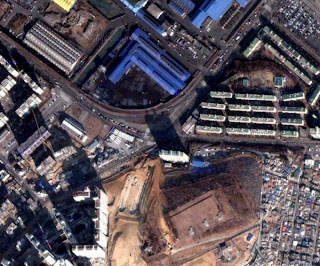The neighborhood of the port city of Incheon in which Space Beam is located is called 'Baedari'. The word is an mix of the Korean words for 'boat' and 'bridge'. In the past this little piece of land was directly reachable from the sea and was used as a storage hub from where incoming goods were spread into neighboring Seoul (1 hr. by subway). Today it's a typical example of an old style working-class neighborhood in Korea with its old single-story houses, traditional restaurants and maze like tiny streets.
Baedari is threatened in its existence by major city developments. The previous mayor of Incheon started to modernize his city at nausea inducing pace. He developed the big island right on the coast into one of the biggest international airports of Korea, put high rise condominiums in the north and an enormous financial district in the south. These three new economic hubs need, of course, a good connection, and thus the idea for a connecting highway was born. Unfortunately for little Incheon, it found itself right in the centre of her big brothers. Development was started but slowed down by the many protests undertook by the people living in Baedari. Space Beam played a big part in these protests by organizing artistic protests. The word 'Beam' in their name sounds similar to the Korean 'Bee-um', which means 'empty', which translates their name into something like ' Empty space'. Their most successful project in the struggle to keep Baedari for it's people is a 500 m2 empty plot of land which they've baptized 'Eco Park'. This land is positioned right in front of the tunnel which forms the first entry of the new highway into Baedari. Since the highway is a private project, the government cannot take ownership of the land, and on top of that they've build the tunnel to low to make a decent connection to the tunnel which leads the highway out of Baedari (both tunnels have yet been made).
When looking at the Baedari area from a lookout point one can see the shape of the highway already mapped out all the way through the neighborhood. Baedari consists out of a little more than 50 families, who have been living their for generations. It makes one wonder about the costs of development: far more families would profit from the new highway, but does that justify the dislocation of 50 family histories?




No comments:
Post a Comment